Anti-Western parties are losing the social media battle in Georgia
Analysis of Georgian parties shows that
Anti-Western parties are losing the social media battle in Georgia
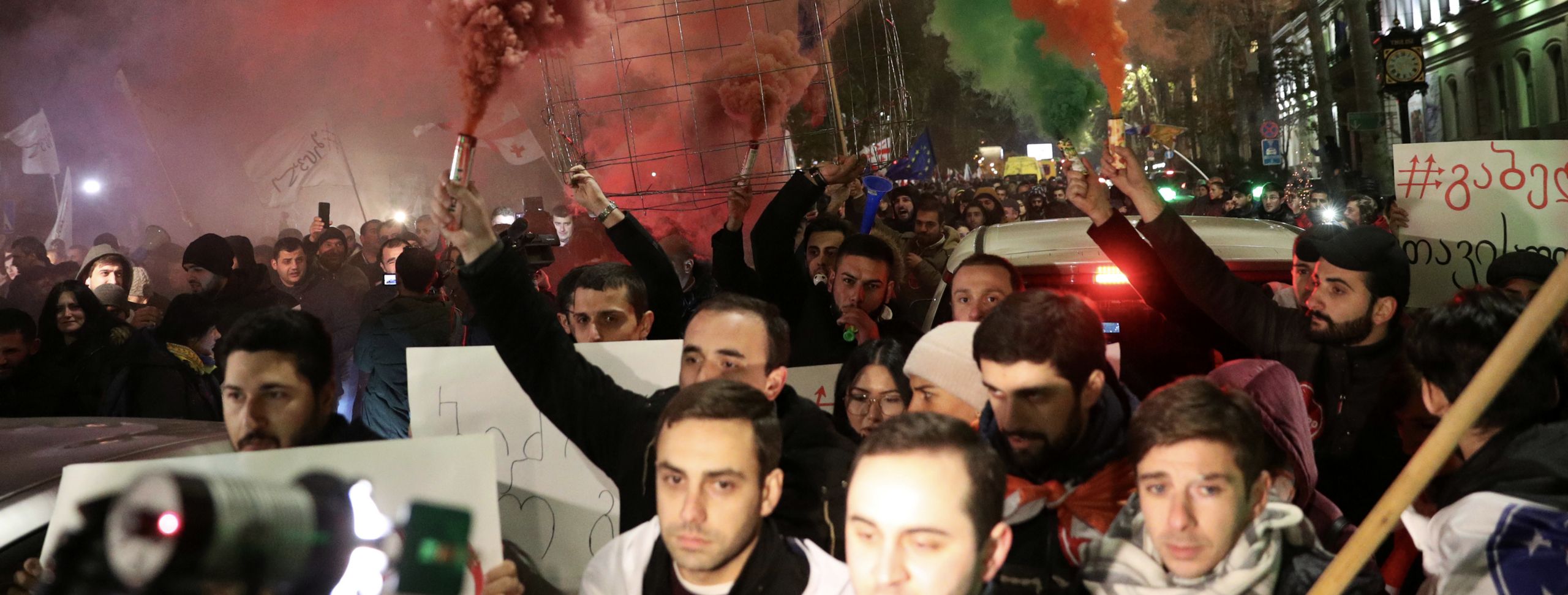
Analysis of Georgian parties shows that anti-Western parties are less active on Facebook ahead of 2020 parliamentary elections
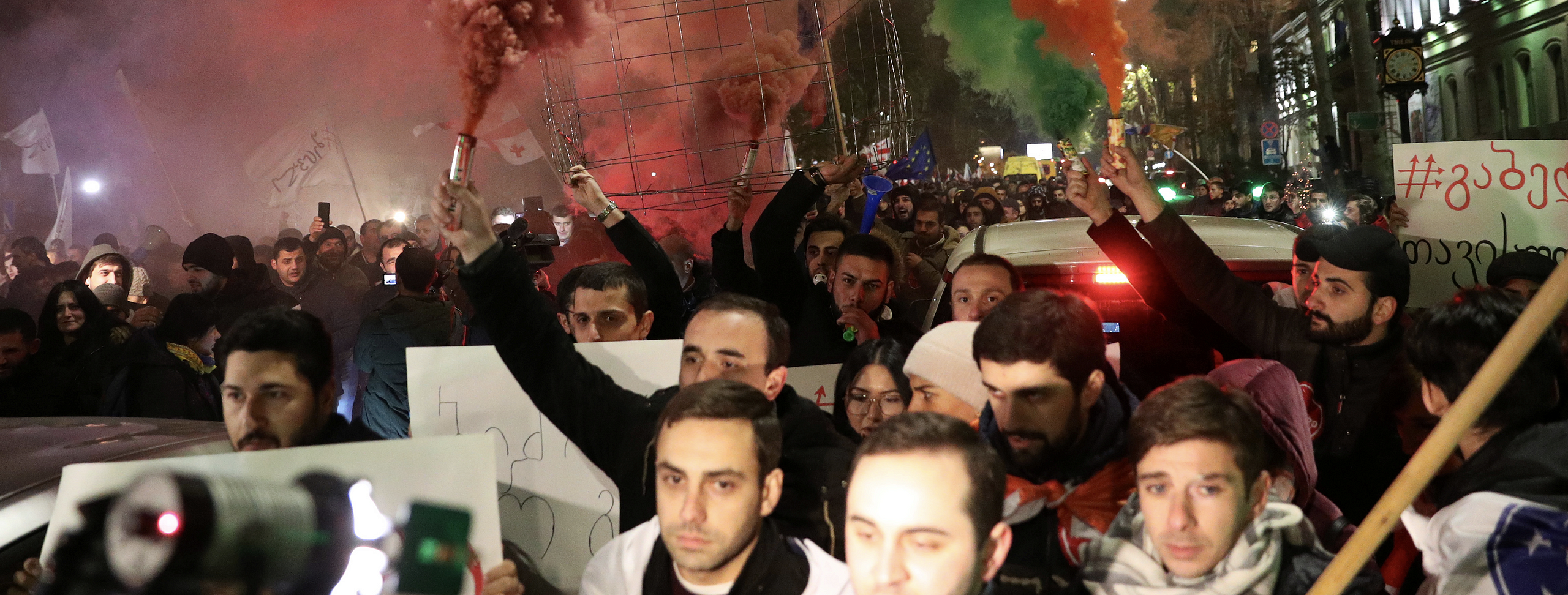
This story was published in partnership with On.ge. სტატია ვრცლად წაიკითხეთ აქ.
Ahead of the 2020 parliamentary elections in Georgia, pro-Western opposition parties are more active on Facebook, have bigger audiences, and spend more resources on political advertisements compared to anti-Western political parties, a DFRLab analysis has found.
Several anti-Western and Russia-friendly parties are taking part in 2020 Georgian parliamentary elections on October 31, and their ideological affiliation and alleged links to the Russian government have created anxiety about the Kremlin’s interference into Georgia’s domestic political processes. An investigative outlet called the Dossier Center, which is led by Russian opposition figure Mikhail Khodorkovsky, recently published leaked documents alleging that the Kremlin is funding the pre-election campaign of the Alliance of Patriots of Georgia political party. Moreover, the Cyber Kmara YouTube channel recently released audio of a phone conversation between Igor Morozov, member of the Russian Federation Council, and Sandro Bregadze, leader of the Georgian March political party. In the audio, Morozov offered to get involved in selling Russian gas in Georgia and earn money from it. This business deal was seen in Tbilisi as part of Kremlin’s attempt to finance the pre-election campaign of Georgian March by means of involving them in business deals. The third Russia-friendly party is Free Georgia, which opposes Georgia’s integration into NATO and is outspoken with its anti-West statements. Lastly, the Georgian Idea political party accused Georgia’s previous government of starting a war against Russia in 2008 and supports direct political dialogue with Russia. Its members also organized and participated in various violent protests.
In view of this, the DFRLab compared the performance of these four parties with the performance of other main political parties running for the elections. The DFRLab selected the 10 biggest Facebook pages of Georgian political parties based on their number of followers. Alliance of Patriots of Georgia and Free Georgia were among top 10 pages. Subsequently, the DFRLab also included Georgian March and Georgian Idea Facebook pages into the selection. As a result, 12 Facebook pages of Georgian political parties were selected for the analysis.
Georgian political parties actively use social networks to maintain engagement with supporters and attract new ones. Business Political Insight interviewed representatives of several Georgian parties, who singled out several advantages of the use of social media in political campaigning. To begin with, unlike traditional mainstream media, social media allows politicians to get direct feedback from their electorate and to have more lively interactions with the audience. Second, communication with the electorate through social networks is cheaper than advertising in traditional media. Third, social media is a much faster way for politicians to get their message out, as it allows them to reach hundreds of thousands of potential voters in the shortest possible time.
Georgian political parties and their audience on Facebook
The DFRLab compared the number of followers of each of the selected Facebook pages and it turned out that the ruling party Georgian Dream and New Political Center — Girchi have almost equally sized audiences in the 155,000-user range. Free Georgia and Alliance of Patriots of Georgia were in the 8th and 9th places respectively in terms of followers. Georgian March and Georgian Idea do not have large Facebook audiences compared to the other parties, at approximately 5,100 and 4,500 users respectively. Overall, pro-Western parties have a much larger combined audience than right-wing, anti-West parties. The relatively smaller size of these audiences may indicate that Facebook users do not find their content compelling, or that the pages do not invest that much in social media campaigning.
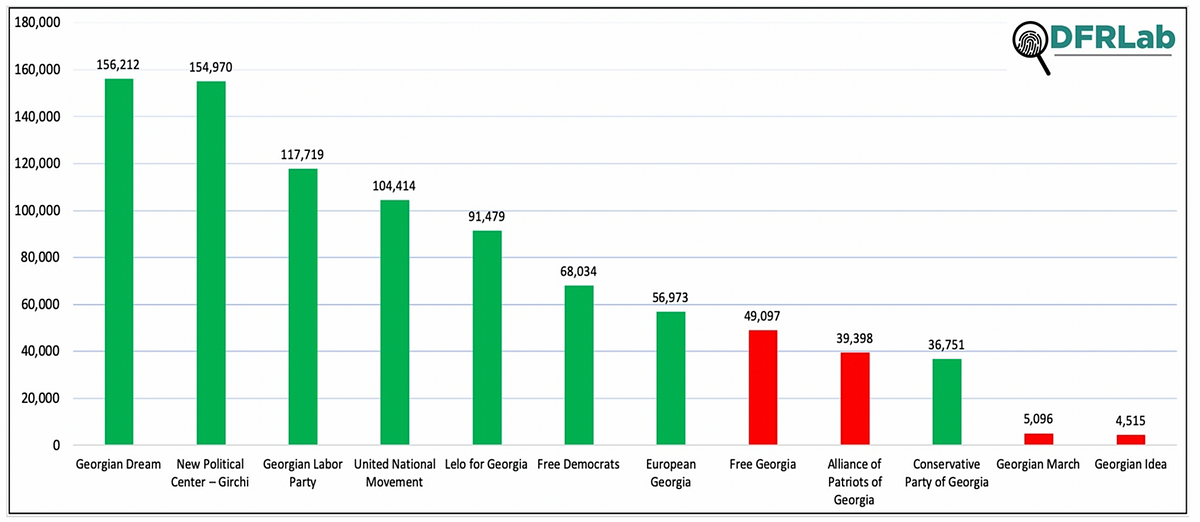
The DFRLab also examined how active Georgian political parties have become during the pre-election period and how it is reflected in the use of social media for political campaigning. To that end, the DFRLab compared posting activity during two time periods — from March through May 2020 and from June through August 2020. CrowdTangle analysis showed that the majority of parties increased their posting activity on Facebook, which can be seen as an additional sign that political parties perceive this platform as an effective medium to interact with their electorate. Remarkably, Georgian March has increased its post activity more than eightfold during two observation windows, but it still posted the smallest number of posts among all political parties. The main pro-European opposition parties, such as United National Movement and European Georgia, also intensified posting content on their Facebook pages, with the latter posting the highest number of posts in total during both observation windows.
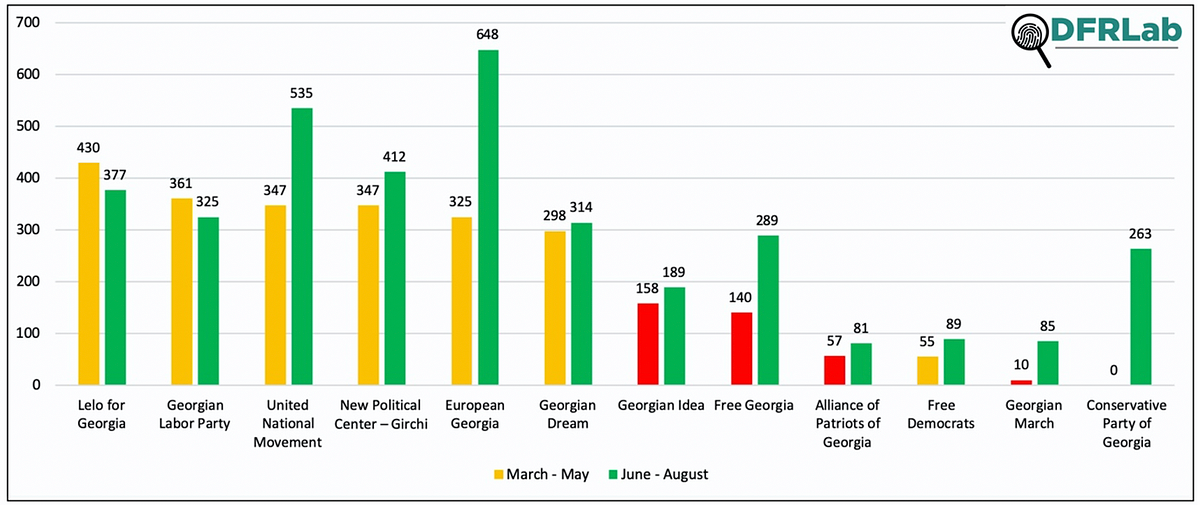
More detailed analysis of their Facebook posts showed that more than 55 percent of posts during the observation window were Facebook videos, which may indicate that political parties see video content as more appealing to their audiences. Facebook videos were followed by photos, representing over 23 percent of posts from March to August 2020. Over 12 percent of posts contained links, and slightly more than 8 percent were Facebook Live streams. Georgian political parties rarely publish status updates, accounting for less than 1 percent of the total.
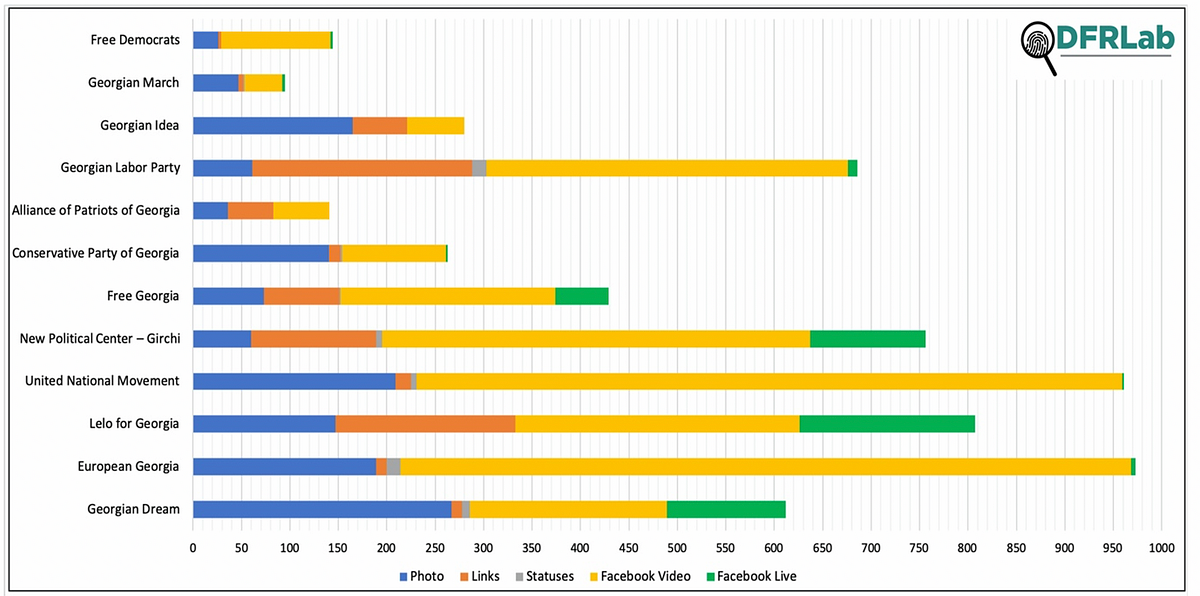
Although some of the political parties have large audiences, user engagement varied significantly across the pages. For example, New Political center — Girchi has the second largest audience with nearly 155,000 followers, but pages with smaller audiences garnered more engagements. All 12 pages combined garnered over 330,00 interactions from March until the end of August 2020. Georgian March, Georgian Idea, Free Georgia and Alliance of Patriots of Georgia together only garnered slightly more than 5.5 percent of total interactions.
The DFRLab also looked at interaction rates for each page, which is calculated by dividing the total number of interactions per post (e.g. reactions, comments, shares) by page likes at the time of posting. Two of the anti-Western parties, Georgian March and Georgian Idea, had the highest interaction rates at 5.02 and 1.44 percent respectively. This indicates that although they have fewer followers than other parties, the level of engagement by their audiences was higher in comparison to other parties.
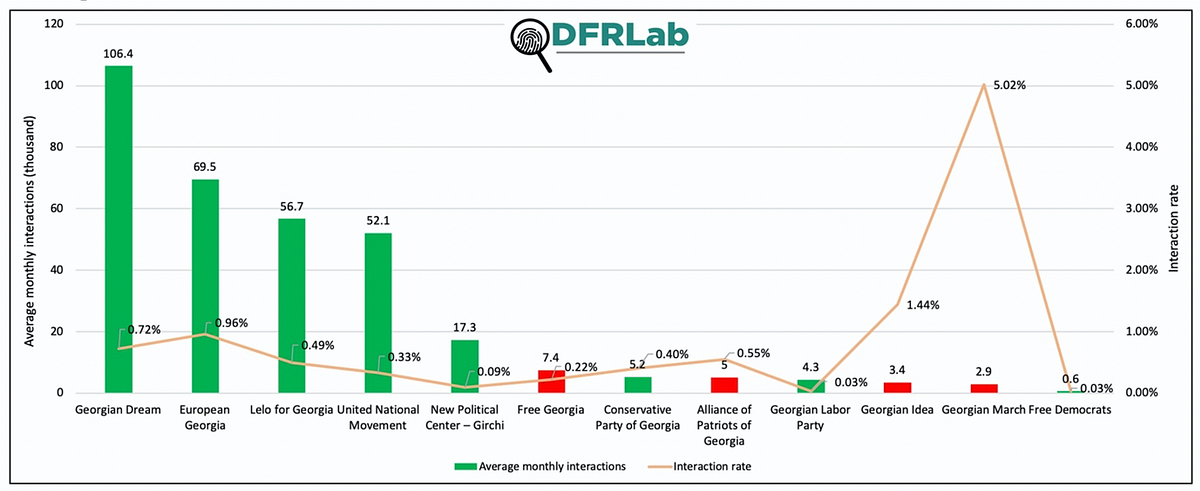
However, some of the engagement on Facebook posts did not seem entirely organic. Georgian user on Twitter @ShotaKincha has recently tweeted screenshots of Georgian Dream Facebook posts, which show many accounts with non-Georgian names and surnames reacting with the angry emoji on one of Georgian Dream’s posts. The DFRLab examined reactions to this post and found that about 20 accounts with non-Georgian names had reacted to it. These accounts displayed indicators that they might belong to “like” farms: they predominantly reacted with one type of reaction — the angry emoji; they did not appear to be the post’s target audience of Georgian users, and the majority provided very little personal information about themselves. The 20 accounts were among 42 others that selected the angry emoji, in contrast to 126 likes and 32 laughs.
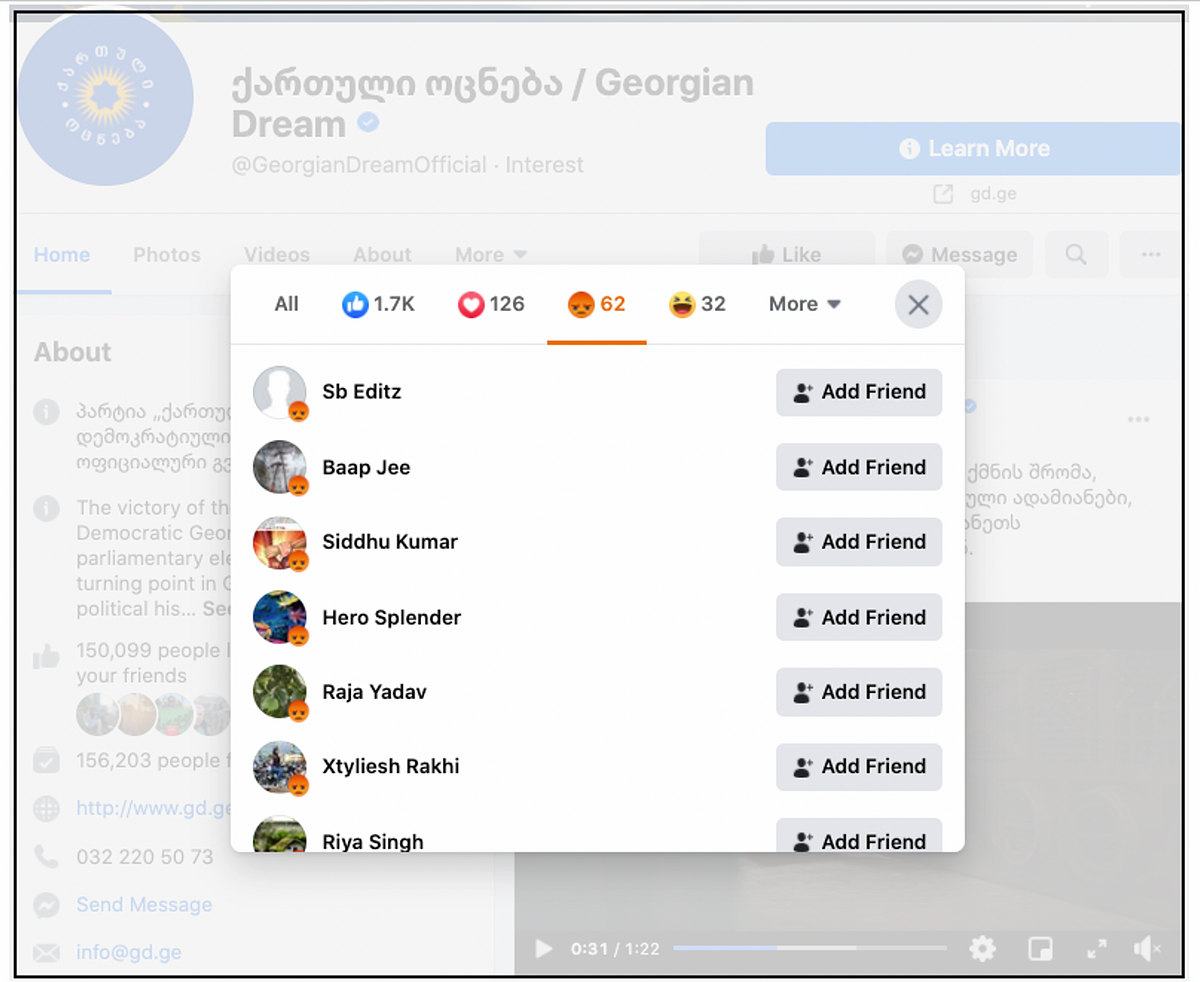
Political ad spending
The DFRLab also examined how much money Georgian political parties have spent on Facebook political advertisements since August 2020, when Facebook launched its Ad Library in Georgia. We also included specific spending by Facebook pages of politicians representing the selected parties. When Facebook pages spend $100 USD or less on ads, the Facebook Ad Library does not display the exact amount spent. Therefore, the DFRLab’s calculation did include those amounts.
Between August 4 and September 18, 2020, the 12 analyzed political parties spent $141,410 USD in total on Facebook ads. The European Georgia party spent the most during this period: almost $57,000. The ruling Georgian Dream party invested almost $40,000 in political advertisements during the same period, followed by the Lelo for Georgia party with around $34,500. Alliance of Patriots of Georgia spent almost $5,000 during the same period. As the DFRLab previously reported, Alliance of Patriots of Georgia ran political ads in early September that portrayed Turkey as an existential threat to Georgia with the aim to distract attention from the threats Georgia faces from Russia. As for the Free Georgia party, it spent $111 on political advertisements.
Meanwhile, Georgian March spent $100 USD or less on Facebook ads, so was not included; the Facebook Ad Library also does not contain information about advertisements by Georgian Idea. Thus, four right-wing political parties spent significantly less money on political advertising than other parties. As for the number of ads, Georgian Dream was leading with over 1,000 ads, followed by European Georgia and Lelo for Georgia, with 487 and 385 ads respectively.
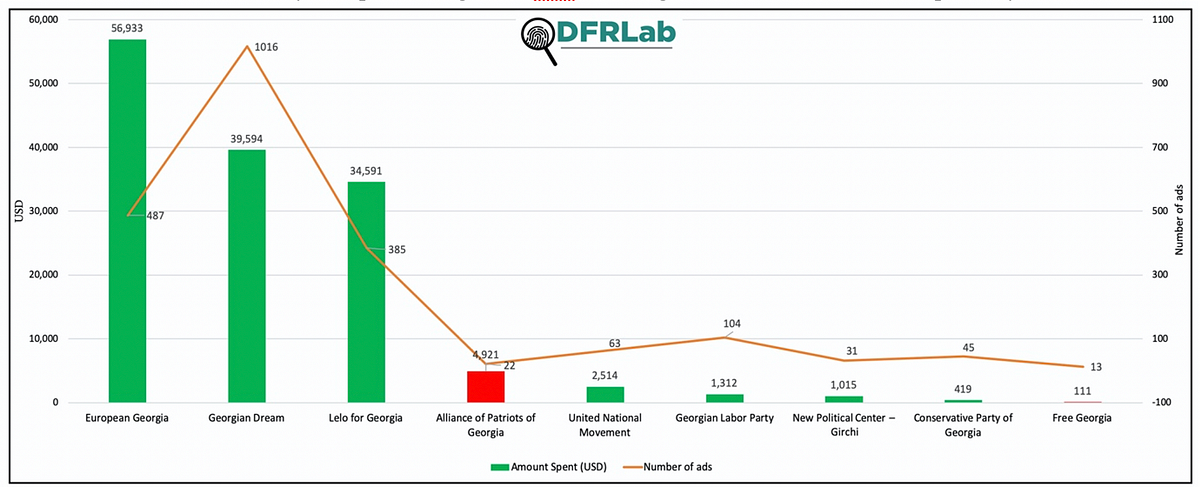
Conclusion
The DFRLab’s analysis showed that some Georgian political parties are more active on Facebook than others. While pro-Western parties are actively posting on Facebook to communicate with the electorate ahead of the Georgian parliamentary elections, anti-Western parties are relatively passive, and their posting volume is much lower. The main pro-Western opposition parties also have a much larger audience than anti-Western parties. Anti-Western parties also spend less money on political advertisements on Facebook and they gather fewer interactions on their content. This suggests that pro-Western political parties are more effective at using Facebook, a platform on which anti-Western parties struggle to compete.
Givi Gigitashvili is a Research Assistant, Caucasus, with the Digital Forensic Research Lab and is based in Georgia.
This research is part of the #ElectionWatch Georgia project in partnership with On.ge, made possible through support from East-West Management Institute (EWMI) and US Agency for International Development (USAID). Contents of this report are the sole responsibility of the author and do not necessarily reflect the views of EWMI, USAID or US Government.
Follow along for more in-depth analysis from our #DigitalSherlocks.

